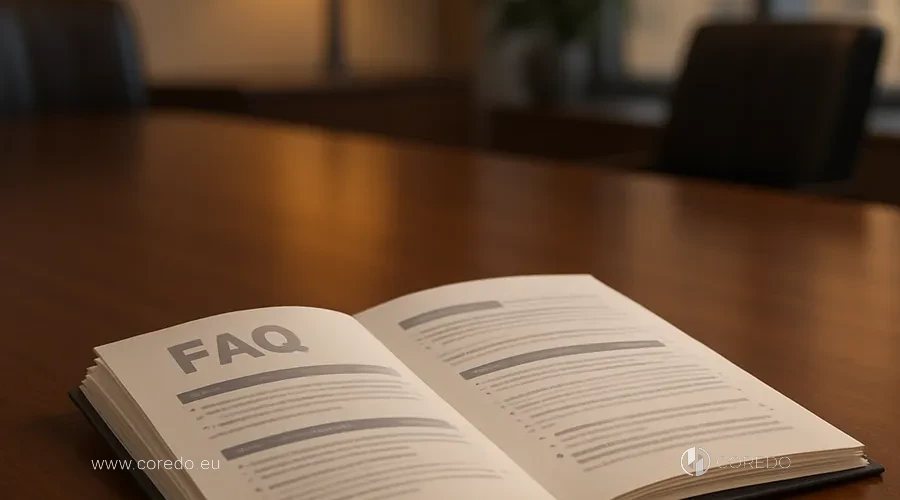Agency agreements, branches, representative offices and even remote employees can lead to recognition of a permanent establishment (PE) if the criteria of independence and substance are not met.
Criteria for an independent agent and their verification

To minimize risks it is important to:
- Conclude an agency agreement taking into account the requirements for agent independence: the agent should work for multiple clients, not be corporately linked to the principal, and make decisions independently.
- Document functions and risks in international transactions to prove the absence of control by the foreign company.
- Use structuring of international operations to reduce tax risks, including multijurisdictional planning and analysis of the corporate structure.
The solution developed by COREDO for one of the European groups included a comprehensive review of all agency agreements, an audit of the corporate structure and the preparation of justifications for the tax authorities.
Cross-border services in digital business: recognition of a PE

Digital business, e-commerce and remote work (digital nomads) create new challenges for international taxation.
COREDO’s practice confirms: for IT companies and digital businesses it is critical to regularly review business processes, document the business purpose, substance and functions of each unit, and also take into account the automatic exchange of tax information (CRS), which enables tax authorities to detect hidden presence.
In practice, this means that issues of recognizing a permanent establishment require a detailed analysis of the business structure and the formalization of the functions of each participant in the process.
Recognition of a permanent establishment: practice of tax authorities and courts

Tax authorities in the EU, Asia and Africa increasingly use a comprehensive analysis: they compare data from banks, corporate registers, employee information and contracts.
In these conditions, judicial and administrative precedents that serve as support for defending the company’s position become especially significant.
Precedents for defending the company’s position
In a recent project, the COREDO team supported a client in a dispute with tax authorities over the recognition of a PE in the Czech Republic. The key arguments were:
- Documenting the preparatory and auxiliary nature of the activities.
- Demonstrating the lack of authority of local representatives to conclude transactions.
- Confirming the independence of agents through analysis of their client base and commercial autonomy.
How to avoid permanent establishment status

Proper structuring of international operations is the key to reducing tax risks and avoiding PE status. Here not only legal formalities matter, but also the real economic substance of the operations.
Choice of jurisdiction and substance in the EU, Asia, Africa
- Assess the ROI of creating substance in the chosen jurisdiction: expenses for office, personnel and compliance should correspond to the potential tax savings and risk reduction.
- choice of jurisdiction with transparent rules and predictable case law.
- Implement multijurisdictional planning and build international holding structures taking into account the requirements for substance and business purpose.
The COREDO team carried out projects to register companies in the Czech Republic, Slovakia, Cyprus, Estonia, the United Kingdom, Singapore and Dubai, where the key success factor was the combination of legal support for the business and the creation of a real presence.
How to confirm the absence of a PE: instructions
To confirm the absence of a PE it is important to:
- Keep detailed documentation for each type of activity, agency agreements and employees’ functions.
- Prepare justifications for tax authorities taking into account the substance-over-form principle.
- Implement internal control and compliance procedures for international companies, including the automatic exchange of tax information and preparation for tax audits.
Key conclusions and recommendations
| Risk/Situation | Practical measure/Recommendation |
|---|---|
| Use of dependent agents | Check independence criteria, conclude an agency agreement taking into account substance and business purpose |
| Providing services through a branch | Assess the nature of the activity (preparatory/auxiliary), keep documentation of functions |
| Operating in multiple jurisdictions | Implement multijurisdictional planning, analyze tax treaties and substance requirements |
| ScalingRecognition of digital business | Consider the risks of remote work, automation, digital nomads; prepare justifications for tax authorities |
| Implementation of new business processes | Document the business purpose, substance; prepare documentation for tax authorities |
Practical steps for entrepreneurs:
- Regularly analyze the corporate structure and functions of foreign subsidiaries.
- Implement internal control and compliance procedures that meet BEPS and MLI requirements.
- Prepare documentation confirming the absence of a permanent establishment, substance and business purpose.
- Evaluate the effectiveness of anti-avoidance strategies not only in terms of tax savings but also considering long-term business risks.
Entrepreneurs’ questions – FAQ

The risk of double taxation, additional assessments, fines, account freezes, loss of reputation and market access. COREDO’s practice shows that the consequences can be long-term and affect the entire group of companies.
An increase in the tax burden, the need to revise the corporate structure, difficulties with opening bank accounts and obtaining licenses, tightening of compliance.
Building substance, implementing multi‑jurisdictional planning, arranging independent agency agreements, maintaining transparent documentation.
Compare expenses for office, staff and compliance with potential tax savings and risk reduction. COREDO’s experience shows that in most cases investments pay off by preventing tax claims.
Requirements for real presence, the economic substance of operations, transparency of corporate structure, and the existence of management decisions and expenses in the jurisdiction of registration.
Maintain detailed documentation of functions, agreements, internal processes, prepare justifications for tax authorities, and perform regular audits of the corporate structure.
Differences in interpretations of permanent establishment in national legislations, the need to adapt corporate procedures, and increased requirements for compliance and internal control.
Increased transparency, easier access for tax authorities to data, greater risks with remote work and digital nomads: regular audits of business processes and updates to documentation are required.
Particular attention is paid to the location of servers, the place of decision-making, the functions of local representatives and the automatic exchange of tax information.
If there are signs of dependence or control by the foreign company, the contract may be requalified, leading to recognition of a permanent establishment. It is important to document the agent’s independence and the business purpose of the agreement.
Regular audits, implementation of compliance procedures, maintaining transparent documentation, training employees and agents, and preparing for tax audits.
Greater attention to detail: not only documents but also real business processes, expenses, management and intercompany relationships are analyzed.
Decisions in cases on PE recognition in Germany, France, the Czech Republic and Singapore, where the key arguments were substance, business purpose and agent independence.
An agent should serve multiple clients, make decisions independently, not be corporately linked to the principal, and have its own resources and risks.
The emergence of tax liabilities in the country of presence, the need to maintain reporting, the risk of double taxation, and tightening of compliance requirements.
Conduct a preliminary risk analysis, structure the business taking substance requirements into account, implement internal controls and prepare documentation for tax authorities.
Detailed agreements, documents on functions and expenses, minutes of management decisions, and justifications of business purpose and substance.
Remote work can lead to recognition of a permanent establishment if employees make key decisions or carry out commercial activities on the territory of another country – regular process audits are required.
Risk of being recognized as a PE, the emergence of taxobligations, the need to maintain reporting and to comply with local standards.
Compare the costs of compliance and structuring with potential tax risks and consequences; COREDO’s practice shows that preventive measures are always more effective than responding to claims from tax authorities.